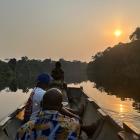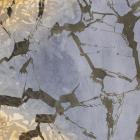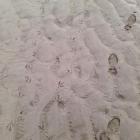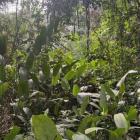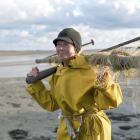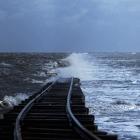Further Reading
General / Theory / Methods
Adam, Barbara. Timescapes of Modernity: The Environment and Invisible Hazards. Routledge, 1998. https://doi.org/10.4324/9780203981382.
Allen-Paisant, Jason. “Animist Time and the White Anthropocene.” New Formations: A Journal of Culture/Theory/Politics 104/105 (2021): 30–49. https://doi.org/10.3898/NewF:104-105.02.2021.
Chakrabarty, Dipesh. The Climate of History in a Planetary Age. University of Chicago Press, 2021. https://doi.org/10.7208/chicago/9780226733050.001.0001.
Eyvaz, Murat, and Ahmed Albahnasawi, eds. Wetlands: New Perspectives. IntechOpen, 2023. https://doi.org/10.5772/intechopen.104315.
Flaherty, Michael G. The Textures of Time: Agency and Temporal Experience. Temple University Press, 2010.
Fluet-Chouinard, Etienne, Benjamin D. Stocker, Zhen Zhang, et al. “Extensive Global Wetland Loss over the Past Three Centuries”. Nature 614 (2023): 281–86. https://doi.org/10.1038/s41586-022-05572-6.
Gergan, Mabel, Sara Smith, and Pavithra Vasudevan. “Earth Beyond Repair: Race and Apocalypse in Collective Imagination.” Environment and Planning D: Society and Space 38, no. 1 (2018): 91–110. https://doi.org/10.1177/0263775818756079.
Ingold, Tim. “The Temporality of the Landscape.” World Archaeology 25, no. 2 (1993): 152–74. https://doi.org/10.1080/00438243.1993.9980235.
Keddy, Paula A. Wetland Ecology: Principles and Conservation. Cambridge University Press, 2010. https://doi.org/10.1017/CBO9780511778179.
Koselleck, Reinhart. Futures Past: On the Semantics of Historical Time. Translated by Keith Tribe. Columbia University Press, 2004.
Lorimer, Jamie. Wildlife in the Anthropocene: Conservation after Nature. University of Minnesota Press, 2015. https://doi.org/10.5749/minnesota/9780816681075.001.0001.
Malhi, Yadvinder. “The Concept of the Anthropocene.” Annual Review of Environment and Resources 42, no. 1 (2017): 77–104. https://doi.org/10.1146/annurev-environ-102016-060854.
Newing, Helen, Stephanie Brittain, Ana Buchadas, et al. “‘Participatory’ Conservation Research Involving Indigenous Peoples and Local Communities: Fourteen Principles for Good Practice.” Biological Conservation 296 (2024): 1–9. https://doi.org/10.1016/j.biocon.2024.110708.
Nordblad, Julia. “Time for Politics: How a Conceptual History of Forests Can Help Us Politicize the Long Term.” European Journal of Social Theory 20, no. 1 (2017): 164–82. https://doi.org/10.1177/1368431016653241.
Proulx, Annie. Fen, Bog and Swamp: A Short History of Peatland Destruction and Its Role in the Climate Crisis. Scribner, 2022. https://doi.org/10.1660/062.126.0307.
Randazzo, Elisa, and Hannah Richter. “The Politics of the Anthropocene: Temporality, Ecology, and Indigeneity.” International Political Sociology 15, no. 3 (2021): 293–312. https://doi.org/10.1093/ips/olab006.
Salimi, Shokoufeh, Suhad A.A.A.N. Almuktar, and Miklas Scholz. “Impact of Climate Change on Wetland Ecosystems: A Critical Review of Experimental Wetlands.” Journal of Environmental Management 286 (2021): 112160. https://doi.org/10.1016/j.jenvman.2021.112160.
Westerfeld, Levi, and Anne Kelly Knowless. “I Was There: Places of Experience in the Holocaust.” Visionscarto, 13 December 2018. Accessed 20 April 2025. https://www.visionscarto.net/i-was-there.
Whyte, Kyle. “Time as Kinship”. In The Cambridge Companion to Environmental Humanities, edited by Jeffrey Cohen and Stephanie Foote, 39–55. Cambridge University Press, 2021. https://doi.org/10.1017/9781009039369.005.
Widlok, Thomas, Joachim Knab, and Christa van der Wulp. “#African Time: Making the Future Legible.” African Studies 80, no. 3–4 (2021): 397–414. https://doi.org/10.1080/00020184.2021.1942786.
On Cameroon
Awum, Harrison Esam. “Access to Discourse, Marginalisation and Exclusion in Conservation-Induced Resettlement: The Case of the Displaced Baka of East Cameroon.” International Journal of Environmental Studies, 73, no. 2 (2016): 294–312. https://doi.org/10.1080/00207233.2016.1148446.
Carson, Savanna L., Fabrice Kentatchime, Eric Djomo Nana, Kevin Y. Njabo, Brian L. Cole, and Hilary A. Godwin. “Indigenous Peoples’ Concerns About Loss of Forest Knowledge: Implications for Forest Management.” Conservation and Society 16, no. 4 (2018): 431–40. https://doi.org/10.4103/cs.cs_17_105.
Djoupee, Bertille. Le Baka: Langue oubanguienne du Cameroun. L’Harmattan, 2025.
Hoyte, Simon, and Felix Mangombe. “No Thanks: How an Ideology of Sharing, not Reciprocating, Ensures Abundance in the Forests of South‐Eastern Cameroon.” People and Nature 7, no. 5 (2024): 1041–55. https://doi.org/10.1002/pan3.10734.
Kouagheu, Josiane. “In Southeastern Cameroon, the Baka People Are Marginalized in the Name of Nature Conservation.” Pulitzer Center. Accessed 24 April 2025. https://pulitzercenter.org/stories/southeastern-cameroon-baka-people-are-marginalized-name-nature-conservation. Originally published as “Dans le sud-est du Cameroun, les Baka sont marginalisés au nom de la protection de la nature.” Le Monde, 20 August 2022.
Nijei, Achu Frida, and Norah Aziamin Asongu. “Development Challenges Amongst the Baka People of the Eastern Region of Cameroon: An Anthropological Perspective.” International Journal of Innovation and Applied Studies 12, no. 2 (2015): 440–46.
Sauber, Maud. “Under Threat: Cameroon’s Dja Reserve and the Credibility of the UNESCO World Heritage System.” Medium: Conservation Watch, 26 August 2016. Accessed 24 April 2025. https://medium.com/conservationwatch/under-threat-cameroons-dja-reserve-and-the-credibility-of-the-unesco-world-heritage-system-8ec5851e6d82.
Tabue Mbobda, Roger Bruno, Chimi Djomo Cédric, et al. “Indigenous Knowledge as a Tool for Wildlife Conservation in the Dja Biosphere Reserve, Cameroon.” International Journal of Social Science and Humanities Research 6, no. 4 (2018): 148–56.
On the Wadden Sea
Brodde, Marco, and Colin Williams. Haunted by the Last Tide: The SWLA in the Danish Wadden Sea. Society of Wildlife Artists, 2023.
Common Wadden Sea Secretariat. “Report on the State of Conservation of the World Heritage Property ‘The Wadden Sea (N1314)’.” Common Wadden Sea Secretariat, 2025.
de Smalen, Eveline, and Katie Ritson. “Imagining the Anthropocene with the Wadden Sea.” Maritime Studies 20, no. 3 (2021): 293–303. https://doi.org/10.1007/s40152-021-00230-5.
de Smalen, Eveline, and Katie Ritson. “Literature and the Wadden Sea: Teaching Coastal Environments through Literature.” Coastal Studies & Society 2, no. 4 (2023): 331–35. https://doi.org/10.1177/26349817231179930.
Döring, Martin, Cormac Walsh, and Beate Ratter. “Emplaced Climate Imaginaries: The Regional Construction of Climate Futures on the German Wadden Sea Coast.” Geoforum 137 (2022): 222–29. https://doi.org/10.1016/j.geoforum.2022.02.010.
Nationalpark Vadehavet. Plan for Nationalpark Vadehavet 2025–2030. Nationalpark Vadehavet, 2024.
Reise, Karsten. A Natural History of the Wadden Sea: Riddled by Contingencies. Waddenacademie, 2013.
Wöbse, Anna-Katharina. “Space, Place, Land and Sea: The Ecological ‘Discovery’ of the Global Wadden Sea.” In Spatializing the History of Ecology: Sites, Journeys, Mappings, edited by Raf de Bont and Jens Lachmund, 204–22. Routledge, 2017. https://doi.org/10.4324/9781315191041-11.
On Morecambe Bay
Bastik, Stuart. “The Seldom Seen Series of Maps: Morecombe Bay.” Art Gene, 2016. https://www.art-gene.co.uk/the-seldom-seen-series-of-maps-morecambe-bay/.
Bunney, Tessa. Going to the Sand. Another Place Press, 2023.
Dean, Claire. A Short History of the Morecambe Bay Sand Library. Aqueous Futures Exhibition, 2023. https://wp.lancs.ac.uk/milieu/aqueous-futures-exhibition/aqueous-futures-9/.
Lloyd, Karen. The Gathering Tide: A Journey Around the Edgelands of Morecambe Bay. Saraband, 2016.
Morecambe Bay Partnership. “Recording Morecambe Bay.” Accessed 27 Febrary 2025. https://www.recordingmorecambebay.org.uk/.
Pollastri, Serena, Joseph Earl, Liz Edwards, and Suzana Ilic. “Morecambe Bay Timescapes: Drawing Together Coastal Futures that Will, May, or Could.” TRACEY 17, no. 1 (2024): 1–17.






